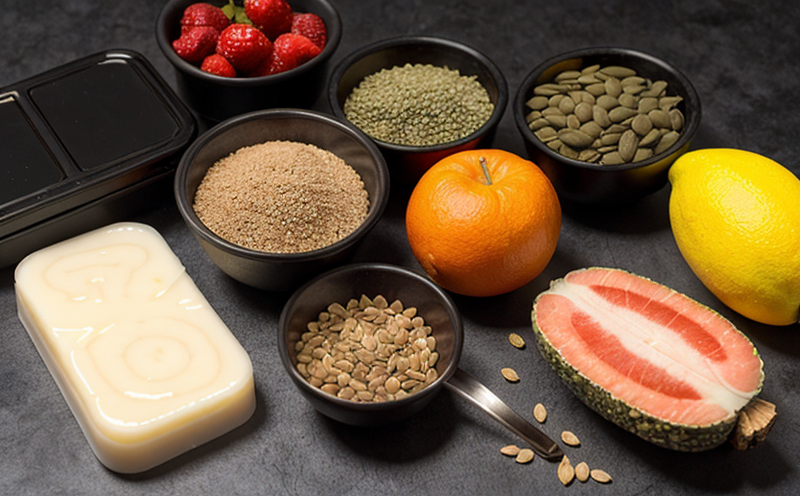EN 18658 Determination of Gross Energy in Cereal-Based Foods
The determination of gross energy in cereal-based foods is a critical aspect of food safety and quality control. This procedure, defined by EN 18658, provides standardized methods for assessing the calorific value of cereals, which are essential components in many processed foods. Understanding the gross energy content ensures that products meet nutritional claims and regulatory requirements.
The process involves measuring the total heat released during combustion, which reflects the caloric potential of the food sample. This method is particularly important for cereal-based foods as they form a significant part of global diets and are subject to stringent quality standards. Compliance with this standard helps ensure that consumers receive accurate information regarding the energy content of their food products.
EN 18658 outlines precise procedures to avoid discrepancies in results, which can arise from variations in sample preparation or analysis methods. The protocol specifies detailed steps for sampling, grinding, and drying the cereal samples before combustion. It also addresses potential sources of error such as incomplete combustion or incorrect calibration of equipment.
The accuracy of this test is crucial not only for regulatory compliance but also for maintaining consumer trust. By adhering to EN 18658 guidelines, manufacturers can ensure that their products are consistently reliable and meet the expected caloric content. This consistency is vital in the food industry, where even small variations could lead to significant quality issues or legal ramifications.
Moreover, understanding gross energy helps in formulating balanced diets, which is especially important for dietary management programs. For instance, knowing the exact calorific value of cereal-based products allows nutritionists and dieticians to provide more accurate advice on portion sizes and caloric intake. This information can be particularly beneficial for individuals with specific health needs or those following a particular diet plan.
| Step | Description |
|---|---|
| Sampling | Select a representative sample of the cereal product. |
| Grinding | Precisely grind the sample to ensure uniform particle size. |
| Drying | Thoroughly dry the ground sample at specified conditions. |
Eurolab Advantages
At Eurolab, we are committed to providing comprehensive and accurate nutritional composition testing services. Our expertise in EN 18658 ensures that our clients receive reliable results every time. With a team of highly skilled analysts and state-of-the-art equipment, we offer unmatched precision and speed.
Our laboratories are equipped with advanced calorimeters designed specifically for the determination of gross energy in cereal-based foods. This allows us to deliver consistent and repeatable test results that meet or exceed industry standards. Our experienced staff is dedicated to ensuring that each sample undergoes thorough analysis, from initial sampling through final reporting.
We understand the importance of timely delivery for our clients, which is why we maintain strict quality control measures throughout the testing process. From accurate sample preparation to precise calorimetric measurements, every step is meticulously followed according to EN 18658 protocols. Our commitment to excellence means that you can trust us to provide you with the most reliable and up-to-date nutritional data.
In addition to technical proficiency, Eurolab offers exceptional customer service tailored to your specific needs. Whether you require routine testing or one-off analyses, our team will work closely with you to understand your requirements and deliver results that meet your expectations. Our flexibility ensures that we can accommodate various project scopes, ensuring seamless integration into your workflow.
Competitive Advantage and Market Impact
Adopting EN 18658 for the determination of gross energy in cereal-based foods offers several competitive advantages that can significantly impact market performance. Ensuring compliance with this standard helps manufacturers stay ahead of regulatory changes and consumer expectations, thereby reducing potential risks associated with non-compliance.
By leveraging our cutting-edge technology and experienced professionals, Eurolab provides clients with a clear competitive edge in the marketplace. Our ability to offer accurate and timely results enhances brand reputation and builds customer confidence. This translates into increased market share and better customer satisfaction, which are key drivers for sustained growth.
Furthermore, adhering to EN 18658 standards demonstrates a commitment to quality and integrity, which is increasingly valued by consumers and regulatory bodies alike. This commitment can lead to enhanced brand loyalty and reduced compliance costs in the long run. By staying ahead of emerging trends and regulations, Eurolab ensures that clients are always aligned with current industry best practices.
In today’s competitive market, companies must continuously innovate and improve their products to maintain a foothold. Our nutritional composition testing services not only help achieve regulatory compliance but also provide valuable insights into product development. This allows manufacturers to refine formulations, optimize production processes, and introduce new products that meet evolving consumer preferences.
Use Cases and Application Examples
| Food Item | Gross Energy (MJ/kg) |
|---|---|
| Bread | 17.5 MJ/kg |
| Pasta | 18.2 MJ/kg |
| Breakfast Cereal | 20.3 MJ/kg |





